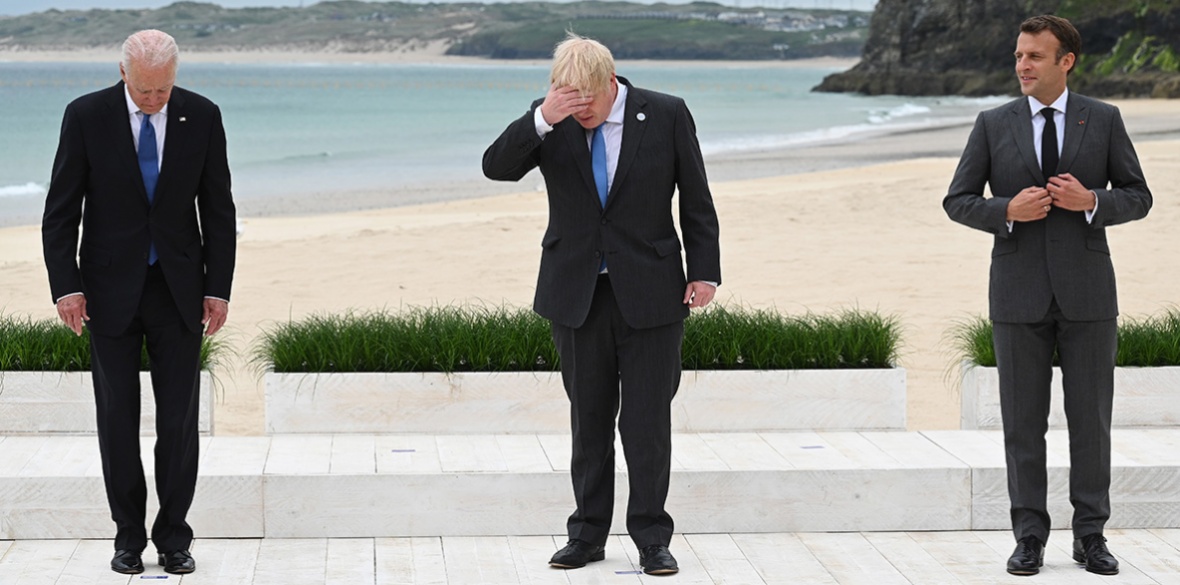This is the last article you can read this month
You can read more article this month
You can read more articles this month
Sorry your limit is up for this month
Reset on:
Please help support the Morning Star by subscribing here
TODAY the US president and the British premier gave their ice-cream cones a last lick, took a lingering look at the West Country beach and got down to business with the other five leaders of the biggest capitalist states.
One question they need to resolve, or at least bear in mind, as they sort out their constantly shifting alignments, is to what extent they exercise decisive leadership over economic, trade and geopolitical questions when the global balance of power is changing.
Russia and China are not included in this discussion and won’t appear in the grinning line-up at the conclusion of the G7.
But a combination of their military and economic weight and the shifting tectonic plates of global power-broking, which entails factors such as volatile political change in Latin America and new economic and political relationships on the Asian landmass, makes this summit less decisive than in earlier times.
Joe Biden wants to restore the centrality of US economic, political and military power as the glue for a restored regime of “multilateralism.”
This is a term that must be read as code for the renewed projection of US imperial power and a restoration of the alliances that Donald Trump’s erratic presidency undermined.
Boris Johnson’s enthusiastic glad-handing and forced intimacy with the US president is his recognition that Britain’s “special relationship” with the US is in danger of being downgraded even further unless he can convince Biden’s masters that even outside the EU Britain can still be a springboard for the projection of US power on our continent.
Much of the media comment is focused on the Northern Ireland Protocol. The bit-player role of two of the EU’s many “presidents” — European Commission president Ursula von der Leyen and European Council president Charles Michel — is to echo French President Emmanuel Macron in insisting that the protocol is sacrosanct.
In this very effort they confirm that it is indeed infinitely renegotiable. No amount of witless posturing by unionists will stand in the way of really big business.
Britain is no longer part of the institutional superstructure of the European Union but the essential features of our country’s integration into, and conformity with, the neoliberal regime that the EU has developed over the last decades has been renegotiated.
Trade in services and goods continue to be substantially tariff-free. State aid to industry and public ownership remain highly regulated while the competitive tendering regime which has laid waste to public services remains.
The British government anticipated the UK-EU Trade and Co-operation Agreement with a late December 2020 UK Internal Market Act which gave effect to a mini-me single market that cloned the EU’s regulatory regime.
The main structural features of the British economy — a much-reduced industrial and manufacturing sector and collapsing investment combined with an overblown financial sector with an overdependence on services — presents the government with special problems.
The 2008 financial crisis revealed the dangers of exposure to the US speculative housing market that comes bundled in with the inflated size of the finance sector.
Much of the Johnson government’s centralising efforts are directed at resolving the contradiction between the traditional Tory focus on controlling expenditure and the need to sustain confidence and secure a minimum level of demand in the economy as a result of the Covid-19 crisis.
We can anticipate further constraints on public spending, increased taxes on working people and a managed inflation to erode wages.
Far from demonstrating that Britain has an equal relationship with the US, this summit reveals Britain as a junior partner, privileged in some ways above others, but subordinate and subaltern.











